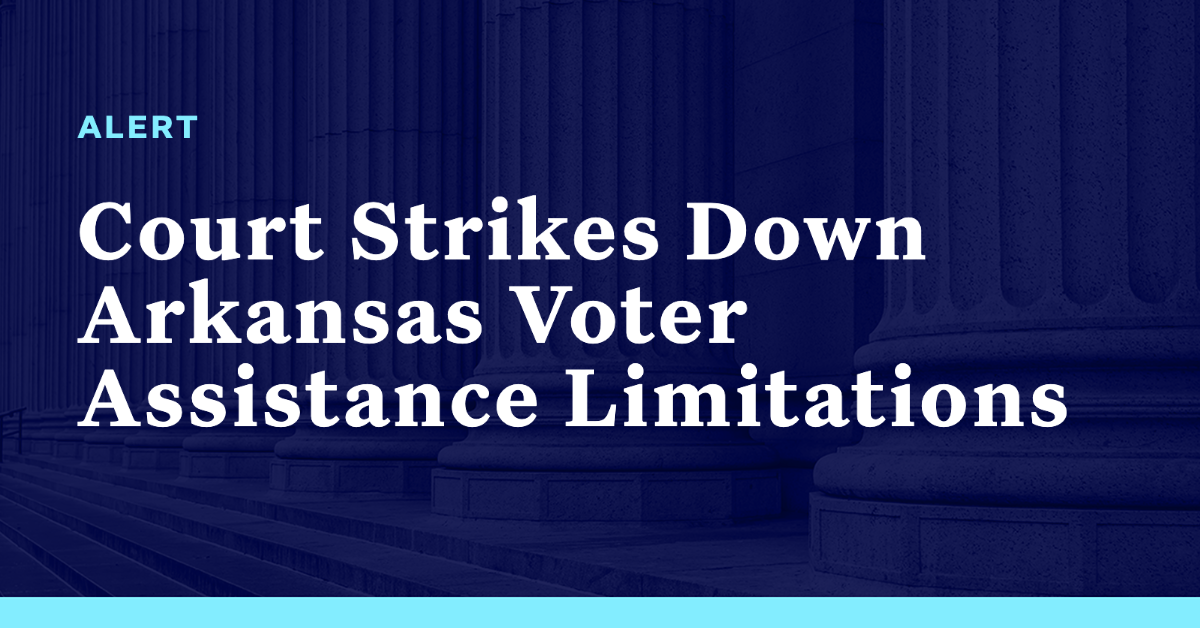berg80
Diamond Member
- Oct 28, 2017
- 20,826
- 17,431
- 2,320
WASHINGTON, D.C. — On Friday, Aug. 19, a federal court in Arkansas struck down state laws that limited the amount of times a person could assist voters in an election. The lawsuit was filed in 2020 by Arkansas United and its founder Mireya Reith against Arkansas Secretary of State John Thurston (R), the Arkansas Board of Election Commissioners and three county election commissions challenging Arkansas election statutes that made it a crime to help more than six voters in one election. The plaintiffs argued that the laws restricting voter assistance disproportionately harmed voters with limited English proficiency who rely on assistance to cast their ballots in violation of Section 208 of the Voting Rights Act (VRA), which ensures that voters with disabilities or voters who have limited English proficiency and need help reading and writing English can access the ballot box. The plaintiffs also asserted that Section 208 establishes the right “of a limited English proficient voter to bring a person of his or her choice to assist him or her in voting even if that assistor has assisted more than 6 voters.” Friday’s ruling struck down the challenged laws that limited voter assistance, preventing the criminal prosecution of people who assist more than six voters in an election.

 www.democracydocket.com
www.democracydocket.com
The incremental chipping away at access to the polls by targeted demographic groups likely to vote for Dems (or why would they be doing it) is a key feature of what the POT is trying to achieve. Of course, there are using more overt methods as well.
The Voting Rights Act of 1965 has been slowly whittled away over the last decade by the Supreme Court — and a case set to be heard in the fall could shrink the protections offered by the law to the smallest level yet.
The redistricting cycle preceding this year’s elections was the first in 50 years to take place without “preclearance” requirements under the law — a pillar of the Voting Rights Act as originally written, in which states with histories of discriminatory voting practices had to have new election laws or practices reviewed by a federal court or the Department of Justice. Chief Justice John Roberts ruled for a divided Supreme Court nine years ago, in Shelby County v. Holder, to strike down the part of the VRA that determined which states and counties were subject to preclearance.

 www.politico.com
www.politico.com

Court Strikes Down Arkansas Voter Assistance Limitations
Stay informed with breaking news updates about voting rights, democracy reform, litigation and legislation.
The incremental chipping away at access to the polls by targeted demographic groups likely to vote for Dems (or why would they be doing it) is a key feature of what the POT is trying to achieve. Of course, there are using more overt methods as well.
The Voting Rights Act of 1965 has been slowly whittled away over the last decade by the Supreme Court — and a case set to be heard in the fall could shrink the protections offered by the law to the smallest level yet.
The redistricting cycle preceding this year’s elections was the first in 50 years to take place without “preclearance” requirements under the law — a pillar of the Voting Rights Act as originally written, in which states with histories of discriminatory voting practices had to have new election laws or practices reviewed by a federal court or the Department of Justice. Chief Justice John Roberts ruled for a divided Supreme Court nine years ago, in Shelby County v. Holder, to strike down the part of the VRA that determined which states and counties were subject to preclearance.
The Supreme Court has chipped away at the Voting Rights Act for 9 years. This case could be the next blow.
The diminished Voting Rights Act has already played a key role in the 2022 elections via redistricting.
